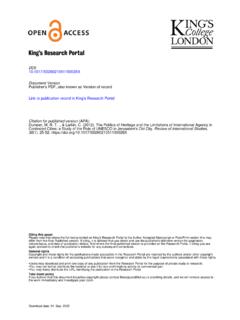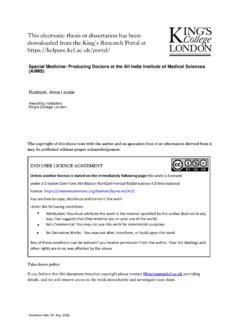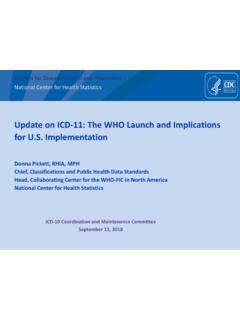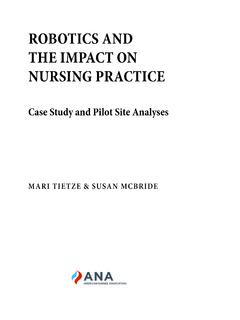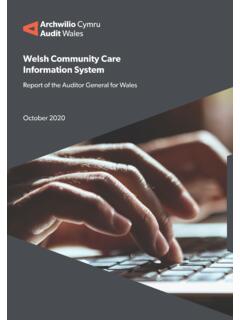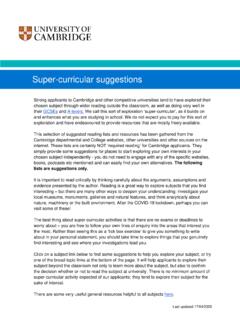Transcription of King s Research Portal
1 King s Research Portal VersionPeer reviewed versionLink to publication record in King's Research PortalCitation for published version (APA):Dagiene, V., Sentance, S., & Stupuriene, G. (2017). Developing a Two-Dimensional Categorization System forEducational Tasks in informatics . Informatica (Netherlands), 28(1), this paperPlease note that where the full-text provided on King's Research Portal is the Author Accepted Manuscript or Post-Print version this maydiffer from the final Published version. If citing, it is advised that you check and use the publisher's definitive version for pagination,volume/issue, and date of publication details.
2 And where the final published version is provided on the Research Portal , if citing you areagain advised to check the publisher's website for any subsequent rightsCopyright and moral rights for the publications made accessible in the Research Portal are retained by the authors and/or other copyrightowners and it is a condition of accessing publications that users recognize and abide by the legal requirements associated with these rights. Users may download and print one copy of any publication from the Research Portal for the purpose of private study or Research . You may not further distribute the material or use it for any profit-making activity or commercial gain You may freely distribute the URL identifying the publication in the Research PortalTake down policyIf you believe that this document breaches copyright please contact providing details, and we will remove access tothe work immediately and investigate your date: 24.
3 Jul. 2023 Developing a two-dimensional categorization system for educational tasks in informatics Valentina DAGIEN , Sue SENTANCE , Gabriel STUPURIEN Vilnius University Institute of Mathematics and informatics 4 Akademijos Street, Vilnius LT-08663, Lithuania King s College London, Department of Education & Professional Studies, 150 Stamford Street, London SE1 9NH E-mail: Received: .. accepted: .. Abstract. Computational thinking is an increasingly important focus in computer science or informatics curricula around the world, and ways of incorporating it into the school curricula are being sought.
4 The Bebras contest on informatics , which originated 12 years ago and now involves around 50 countries, consists of short problem-solving tasks based on topics in informatics . Bebras tasks engender the development of computational thinking skills by incorporating abstraction, algorithmic thinking, decomposition, evaluation and generalization. Bebras tasks cover a range of informatics concepts including algorithms and data structures, programming, networking, databases and social and ethical issues. Having built up a substantial number of Bebras tasks over 12 years it is important to be able to categorise them so that they can be easily accessed by the Bebras community and teachers within schools.
5 The categorization of tasks within Bebras is important as it ensures that tasks span a wide range of topics; there have been several categorization schemes suggested to date. In this paper we present a new two-dimensional categorization system that takes account of computational thinking skills as well as content knowledge. Examples are given from recent tasks that illustrate the role that Bebras can play in the development of computational thinking skills. Keywords: Bebras contest, computational thinking, informatics concepts, informatics education, categorization, databases.
6 1. Introduction Attracting youngsters to choose to study computer science or computing (widely known as informatics in Europe) at high school has always been a challenge for computer science educators. The idea of developing a contest in informatics and computer fluency for school students originated in the Institute of Mathematics and informatics , Lithuania (Dagiene, 2005; 2006). The contest has now been extended to become a challenge and is being held in more than 50 countries. The challenge name Beaver in Lithuanian Bebras was chosen in connection with the hard-working, intelligent, goal seeking and lively wild animal.
7 The Bebras challenge is an informatics education community-building model and is designed to promote informatics learning at schools by solving short concept-based tasks (Dagiene & Stupuriene, 2016). Alongside the initial goal of the Bebras project to motivate students to be more interested in informatics topics, there is a strong intention to deepen algorithmic and operational thinking; more recently this is also extended to computational thinking. Tasks are the most important component for developing computational thinking. In accordance with requirements, each Bebras task should include at least one informatics concept, attract children s attention by a story, picture or interactivity, be short (fit on a computer screen), and not require specific technical knowledge.
8 Part of the task development is the categorization of tasks with the intention of having a broad range of tasks across different content areas. In this paper we examine the relationship between computational thinking and Bebras challenges with the intention of developing a new categorization system for informatics educational tasks that includes both content areas of computer science (knowledge) and computational thinking (skills). The developed categorization system was presented and tested at an international Bebras workshop in May 2016. 2. Computational thinking The term computational thinking was popularised in 2006 with Jeanette Wing's article (2006) but actually originated with Seymour Papert s constructionist learning ideas (1996).
9 There are differences between these two definitions in that Wing's definition is more focused on problem solving and Papert's definition is more focused on ideas and analysis (Mannila et al, 2014). Subsequent Research has expanded and interpreted the term further (Grover & Pea, 2013; Kalelioglu et al., 2016; Lu & Fletcher; 2009, Selby & Woollard, 2013; Wolz et al., 2011). Computational thinking is not entirely embraced by all; critics suggest that the term is narrowing (Denning, 2009) or that computational thinking processes are widespread in other sciences (Hemmendinger, 2010).
10 Indeed, definitions of computational thinking tend to be by example (Lee et al., 2011). However, there is a huge interest in computational thinking as a means of explaining the thinking processes in computer science in school education (K-12); in USA computational thinking underlies the new curricular developments of the Computer Science Teacher Association (CSTA) and ; in England, computational thinking is at the core of a mandatory new Computing curriculum from age 5-16; and Google has launched a teacher development MOOC (Massive Open Online Course) purely around computational thinking.


